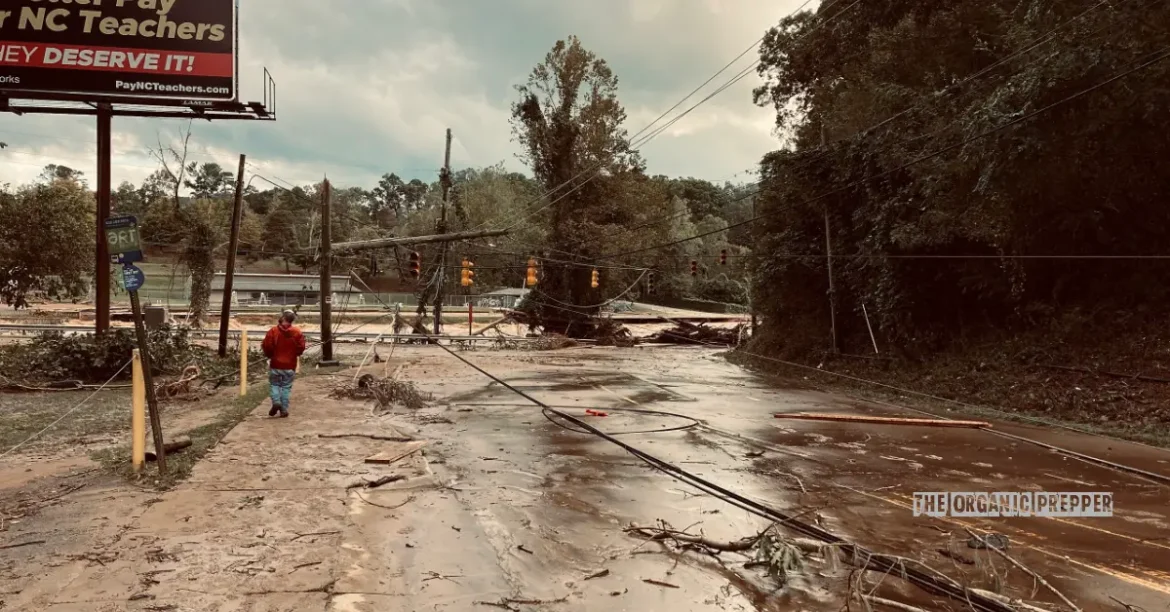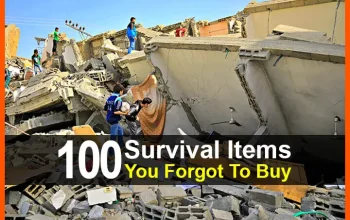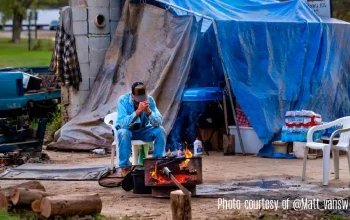(Psst: The FTC wants me to remind you that this website contains affiliate links. That means if you make a purchase from a link you click on, I might receive a small commission. This does not increase the price you’ll pay for that item nor does it decrease the awesomeness of the item. ~ Daisy)
Put yourself into this (fictional) scenario.
Your adrenaline is still pumping through your veins at an astounding pace after the mud came down the mountain and pushed your house, your truck, and your garage right off of their foundations and out of sight.
Despite the chaos and ruin, you feel lucky. Your entire family somehow miraculously survived, and you are all together.
You grit your teeth and go carefully into what’s left of the foundation of your house. You have another thing to be happy for. Not much survived, but you spy those big blue bins in which you store camping gear. Again, you feel blessed.
You set up your tent, you build a campfire, and you try to make it fun for your kids. But there’s nothing to eat, and nothing to drink, and you know you’re going to have to trek into town on foot, with your children, because you certainly aren’t leaving them there.
To your astonishment, the entire town is gone, swept away into the river that runs through it. There is no place open where you can get help. Other people are walking around blankly, shell-shocked from the intensity and destruction of the disaster. You hear of a kind soul who is feeding people and hopefully go over there. You’re led by the smell of the barbecue, and welcomed when you arrive. This neighbor has decided to use up the meat in his freezer before it spoils. From the looks of things, no power will be back on any time soon.
You trudge back home with a cherished gallon of water and you play camping games with your kids until they finally fall asleep. Only then can you let down your guard and weep for all that you lost.
Surely, help will arrive soon, you think, as you drift off to sleep.
Days go by and they turn into a week, then two. You’ve seen a few volunteers who have dropped off supplies such as food and water. Your kids are delighted by the team of pack mules bringing more supplies.
The government is nowhere to be seen, and you can’t get any news, and you wonder if there will ever be help available to get you back on your feet.
You’ve developed a new routine of cooking something over a morning campfire, then walking down to the one remaining building, a local church. There, you pick up supplies and water, then make the steep walk home. Oddly, amidst all this, you kind of enjoy the time with your kids, free from digital distractions.
Finally, you learn that the cavalry is here, and you can get that $750 you heard about in immediate emergency aid. But you’re just given a website to submit an application – there is no help immediately. You also apply for emergency housing. Later, you learn you’ve been declined and they won’t tell you why.
Weeks turn into a month and then two. Your insurance claim has been denied because flood insurance didn’t seem necessary up on a mountainside. Nothing is covered.
Finally a couple of folks with clipboards and FEMA jackets arrive. They won’t give you emergency housing because they’ve deemed your property to be “on a flood plain.” They talk about helping you relocate but you’re not interested. This land is all you have left. You will figure something else out.
Then, two days later more officials show up. They are from the Department of Social Services. They tell you that the camp you’ve created out of the few things you have left is not suitable for children to live there and that unless you find suitable shelter, your kids will be going into foster care.
A few days after that, the DSS people show up, and they’re escorted by an armed law enforcement officer. They won’t be swayed by screams, entreaties, threats, or tears. Your children are gone, and you’re given a business card with a phone number to call to find out where they are.
You feel defeated, but go to where the town used to be to make the phone call. You’re told that your children have been separated. The foster homes are in different directions, several hours away. If you don’t visit them every month, you’ll lose your parental rights. You don’t have a car, you don’t have money, you have no idea how you will get there.
A few real estate developers show up and also give ridiculously low offers, but they will put cash in your pocket right away. You run them off because this land has been in your family for many generations. Then you are gripped by fear that you should’ve taken the money anyway because it would allow you to set up someplace else and get your children back.
You hear that FEMA has a buyout program for the “pre-disaster marketplace value of your property” and leave it “open space in perpetuity. You’re desperate to find your children. You look deeper into the process. Then you learn it’s a tax assessment value that doesn’t include the beautiful house you had built there.
Your back is against the wall, snow is falling, you live in a tent, and you lost your children. Finally, you take an offer from a real estate developer. You’ll immediately have enough money to get an older car and settle somewhere else where you can get your children back.
But don’t worry. As any mainstream media fact-checker will tell you, this isn’t a land grab. You’re not being forced off your property. You made the decision to sell, didn’t you?
It was all voluntary.
About this story
While the story above was fictionalized, people in the hardest-hit areas of Appalachia are reporting all of these things happening to them. Not one single element is entirely fiction. It’s all based on the words of eye-witnesses who are there
For more information about the lack of assistance, go here and see the testimonies of the people themselves. Scroll down to look at the recommendations for providing help if you feel so moved.
I had begun writing this as a brief introduction to an article about what folks are calling “the land grab.” But it kept flowing and in the interest of not making it super long, I’ll continue reporting on this next week.
What would you do if faced with a situation like this?
And remember, the disaster could strike your property next. You, too, will be facing these decisions. You have no insurance payout, no assistance payout unless you leave your land, and your children are veritable hostages. What would you do?



